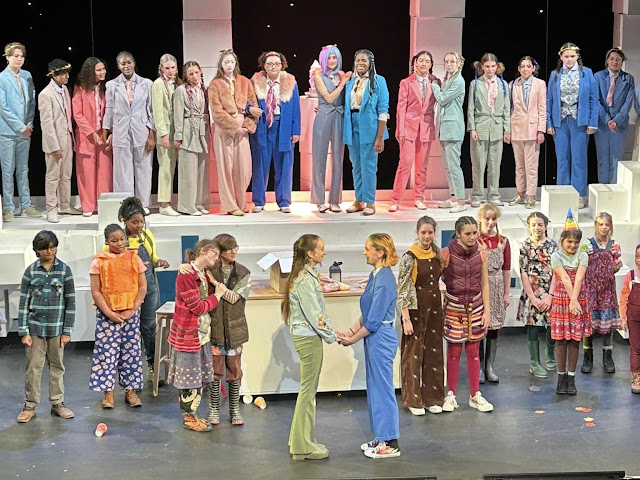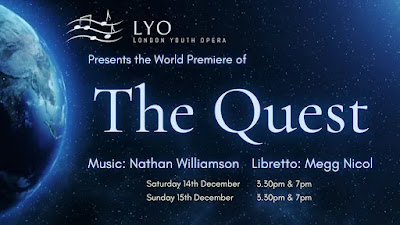London Youth Opera’s latest production is a new opera, The Quest inspired by the Auden and Isherwood play, The Ascent of F6. The opera has a clear, contemporary message both for the young performers and for older adult audience members. I recently met up with composer Nathan Williamson to find out more.
London Youth Opera‘s 2024 production is the world premiere of The Quest by composer Nathan Williamson and librettist Megg Nicol at the Shaw Theatre with performances on 14 and 15 December 2024. Now over 50 years old and originally formed as W11 Opera, the company is an opera company for young performers aged 9-18, staging original commissions written for and performed exclusively by children, with a profession team directing and staging the work.
The Quest is a 75 minute piece with small instrumental ensemble and Nathan has been working on it with the company’s music director Alastair Chilvers for over a year. This year there is a cast of some 45 children, mainly 11 and above but some younger. The new opera has some three or four lead characters with the other singers in a variety of roles in different ensembles. Before COVID the company had around 60 performers but having lost two years to the pandemic, they are gradually building up numbers again. The company runs an annual season from September to December with two rehearsals per week, though when I spoke to Nathan the rehearsal schedule had ramped up as the performances neared.
The opera concerns a group of young scientists who have found a way to save the planet from the current environmental crisis. But politicians get involved and try to piggyback on the developments to suit their own ends. The heroes of the opera have to decide whether to stick to their scientific principles or to compromise.
The concept of a group of very pure idealists versus pragmatic, self-serving politicians is drawn from the play, The Ascent of F6 which was written in 1936 by WH Auden and Christopher Isherwood (with Britten providing the incidental music for the play’s premiere in 1937). In the play a group of explorers set off to reach the peak of a mountain as the government tries to take over their achievements.
For Nathan, their opera has messages both for the young performers and for the older audience members. For the young people, the message is that there isn’t just wisdom amongst those in charge; in the opera it is the young people who have integrity. Whilst the message to the older audience members is listen to the young, the young are the future. Nathan comments that it isn’t rocket science to understand why they feel moved to address the issue.
The work was written specifically for London Youth Opera, for children to sing. Nathan has worked on pieces for children before including one of Mahogany Opera’s Snappy Operas. For Nathan, a child’s voice is simply a different instrument to the trained voice and writing for children is neither a compromise nor less ambition in artistic aims. He sees the children’s voices as simply different, and he points out that anything is a compromise if it isn’t what you want to do.
The advantage of having the children as performers is the lightness their voices, the greater emphasis on the text, with a more conversational way of delivery. Untrained voices have a certain natural feel to them which Nathan finds rather wonderful, and he comments about imagining Pavarotti singing the opening solo to Once in Royal David’s City rather than a lone treble. Nathan’s writing has needed to avoid anything overtly virtuosic and he has created music that is deliberately melodic. Megg Nicol’s text is written in metre and rhyme, for ease of learning and his music follows this and is largely symmetrical in form. There is quite a bit of G&S-like patter and Nicol’s text is often busy, though some passages are more romantic and mystical.
 |
| Stuart Hancock: Pandora’s Box – London Youth Opera at Susie Sainsbury Theatre, Royal Academy of Music in 2023 (Photo: Nina Swann) |
The opera represents, for Nathan, an opportunity to put words and melody together in a form of vocal writing that is not entirely common for a modern composer. Setting stropic/metrical texts is not something routinely asked of a contemporary composer and Nathan has found that he has enjoyed it. He has experience doing arrangements and writing music for theatrical shows and admits to enjoying writing a melody that anyone can sing. And he points out that we all started out in music by singing in some way.
Full details from London Youth Opera’s website.











